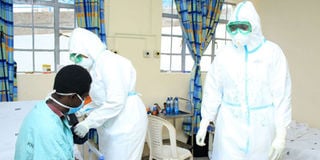Premium
Covid-19: Alarm as hospitals run out of ICU beds

An ICU ward at the Kenyatta University Teaching, Referral and Research Hospital which admits Covid-19 patients.
Hospitals around the country are running out of beds in their intensive care units as Covid-19 spreads fast across the country in a third wave.
The hospitals are quickly getting overwhelmed with critically ill patients that need admission, forcing them to set aside other rooms and, in extreme cases, turn away patients for lack of space.
Both infectious disease units at the Kenyatta National Hospital (KNH) and Mbagathi Hospital are almost full.

Medics attend to a Covid-19 patient in an isolation ward at the Kenyatta National Hospital's Infectious Disease Unit in Mbagathi, Nairobi.
A spot check at other private hospitals, including the Aga Khan and Nairobi hospitals, reveals that only a few beds remain, although the source did not reveal the number since he is not authorised to speak to the media.
This comes as the number of cases and those admitted in ICU continues to increase drastically, while experts warn of dire consequences and even death, due to lack of beds.
Yesterday, President Uhuru Kenyatta also expressed concern that hospital beds, especially in the ICUs, were filling up in both public and private hospitals.
The president urged Kenyans to step up vigilance as Covid-19 infections were increasing at an alarming rate.
President Kenyatta has cautioned the situation has been worsened by a new strain of coronavirus that has emerged in Britain, Brazil and South Africa.
“We do not know how it will spread and the havoc it will wreck on our population,” the president said last Friday, as he regretted the positivity rate had risen from two percent in January to 13 percent this month.
On Monday, the country recorded a 16.2 per cent positivity rate, after 731 cases turned positive from 4,513 samples tested in the last 24 hours. Of these, 109 patients are in ICU.

Some of the doctors and nurses stationed at the Infectious Disease Unit (IDU) and Intensive Care Unit (ICU) of the Kenyatta University Teaching, Referral and Research Hospital.
On March 14, about 2,748 patients were admitted with Covid-19, with 668 in various hospitals and 2,080 on home based care. The ICU had 114, a number that is now worrying the experts.
Doctors and researchers said the shortage of hospital beds is already causing serious damage and when patients are many and they have nowhere to be admitted, it is a double tragedy because the number of deaths is going to increase.
On Monday alone, five Covid-19 patients died. The death toll since the pandemic struck a year ago is in excess of 1, 800.
Nairobi County is registering the highest number of cases and it is where some of the best hospitals are reported to be filled up, revealing a picture of the nation’s hospital crisis in the coming days.
“It is really going to be difficult to maintain existing standards of care for the sickest patients because you find out that it is in Nairobi -- with the huge number of patients -- and it is the same area where the ICUs are completely full, or fewer than five per cent beds available,” said Dr Ahmed Kalebi, CEO of Pathologists Lancet Kenya, one of the private labs testing for Covid-19 in Nairobi.
Get worse
Dr Kalebi expressed hope that it will not get worse, reminding Kenyans to adhere to public health measures to prevent infection.
“Ensure that you mask up, wash your hands and observe social distance, this is for your own good,” he said.
“This disease progresses very quickly and can get very ugly very fast. When you don’t have that (ICU) capacity or the beds are full, then this means that people will die,” he said.
Acting Director-General of Health Patrick Amoth warned Kenyans to be careful.
“If you’re living in a place where you know very well that you will struggle to get an ICU bed, then you need to start thinking about your life and be careful about the social distance measure. If you should not be there, what are you doing there? If you should be there, sit apart and mask up,” Dr Amoth said.





